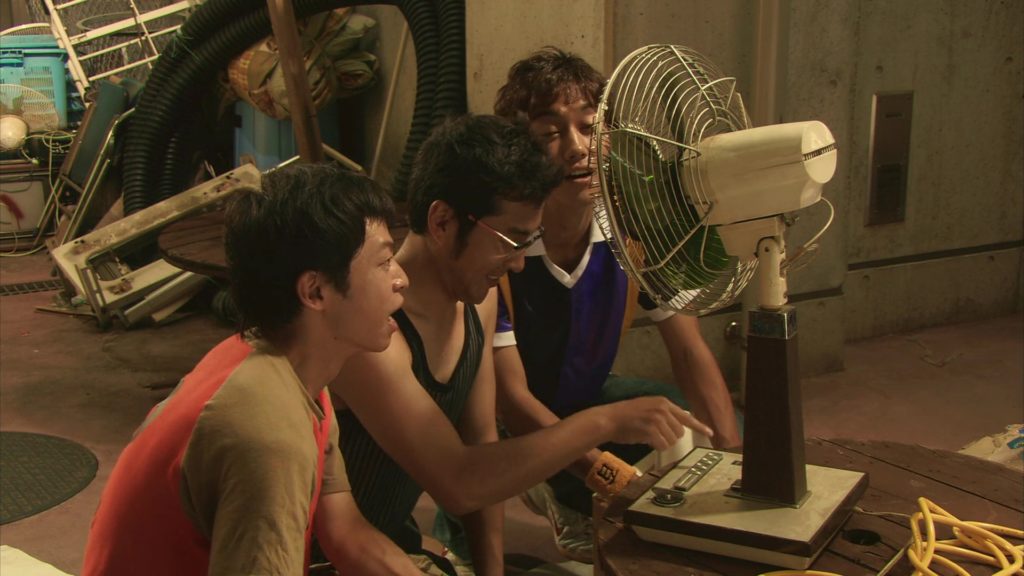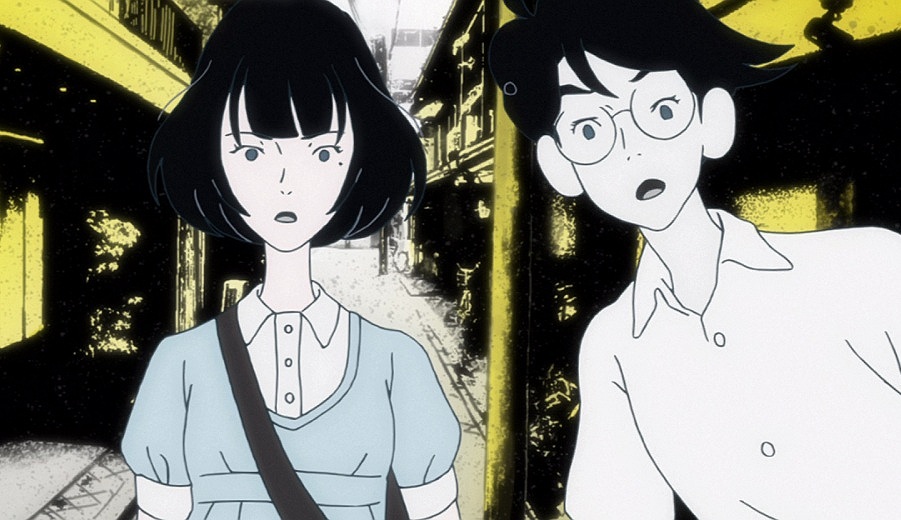The Time-Bending Tales of Makoto Ueda
February 6, 2023 · 2 comments
By Tom Wilmot.

Writers tend to have a motif, an idea or theme that persists throughout their work, distinguishing their projects and allowing them to form an artistic identity. In the case of Makoto Ueda, this idea is one of time. The co-founder of the theatre group Europe Kikaku has toiled on many wonderous sci-fi projects over the years, whether they be comedic stage productions or adapted screenplays. However, from his personal shorts to feature-length films, playing with time has remained a hallmark of Ueda’s work.
To understand why time has played such a vital role in Ueda’s development as a writer, we have to leap back to 2001, the year of Europe Kikaku’s first big on-stage hit, Summer Time Machine Blues. Sci-fi comedy has always been the theatre group’s bread and butter, so it’s no surprise that Ueda’s first bona fide hit involved a bunch of over-zealous teens who stumble across a time machine during their summer break. The troupe have also dabbled in tales of UFO abductions and a psychic gathering on Christmas Eve, but it was the sun-soaked time travel caper that caught the eye of director Katsuyuki Motohiro. Enamoured with the story and its cinematic potential, the filmmaker approached Europe Kikaku and Ueda with the prospect of a big-screen adaptation, which eventually hit cinemas in July 2005.

Broadening the scale of the original stage-play, Summer Time Machine Blues follows the boys of a university sci-fi club as they discover a time machine sent back 25 years from the future. Given the sweltering summer heat, the boys naturally decide to use this new-found time-toy for an important mission – retrieving the air conditioner remote that was broken the day before. However, meddling with the fabric of time poses a serious threat, one that the guys and gals of the sci-fi and photography clubs must quell if they’re to avoid disappearing from the world entirely…potentially.
Shaking off the limitations of a stage production, Ueda adds fresh and ambitious plot elements to the film, making the most of new environments and conjuring up more whacky high jinks for our band of teenaged heroes. A mysterious case of stolen shampoo from a bathhouse and the local legend of a sacred kappa all factor into this absurd tale. Motohiro’s restrained directorial approach and stylistic preferences elevate this new material, as he litters the frame with visual clues for us to piece together later. Particularly fun are the horizontal split-screen scenes, which juxtapose the two concurrent timelines of past and present to demonstrate further how time travel works in this world.
In a new interview included with Third Window Films’ Blu-ray release of the movie, Ueda notes that you’d typically expect a film version of a stage production to be much grander in scope. Yet, it’s precisely the small scale feel of Summer Time Machine Blues that gives the film its charm. There’s no overbearing, world-ending plot or fate-shifting narrative at hand, just a band of boisterous high-schoolers who happen to disrupt the space-time continuum. Some not-so-subtle nods to Back to the Future (1985) and even H.G. Wells’ classic sci-fi novel, The Time Machine, add a tongue-in-cheek element to a film as Ueda’s story rolls mischievous teen-comedy and upbeat sci-fi adventure into one.

And yet, Summer Time Machine Blues is but one of several Makoto Ueda-penned projects that play with the concept of time travel. The screenwriter has turned director on a handful of personal short films that explore different ways of visualising time travel. Two of the shorts included on the new release, Time Machine and A Little Fugue of Love, explore basic time travel concepts and shooting techniques, while 2014’s Howling is effectively a trial run for Europe Kikaku’s first feature film, Beyond the Infinite Two Minutes (2020). Penned once again by Ueda, the latter is an ambitious and innovative exploration of a TV-induced “Droste effect”, essentially an infinite time loop that allows a coffee shop owner and his pals to see several minutes into the future.
With all of these projects, Ueda has established his own rules for time travel, doing away with the idea of parallel worlds and restricting his tales to one clear timeline. A self-confessed stickler for precision and order, the screenwriter describes both Summer Time Machine Blues and Beyond the Infinite Two Minutes as “time-puzzles which are done on a very small scale”. While Ueda admits that his time travel plots might come across as too technical, directors Katsuyuki Motohiro and Junta Yamaguchi have made these tales as exciting to watch as they are fun to deconstruct.

With a penchant for time travel and bizarre sci-fi in general, it’s perhaps no surprise that Ueda has penned anime adaptations of several fantastical novels from prize-winning author Tomihiko Morimi. The first and arguably most beloved of these adaptations is The Tatami Galaxy (2010), an 11-episode series co-written with director Masaaki Yuasa. Those familiar with the tale will know that it follows a Groundhog Day-like narrative, as our unnamed student hero returns to a pivotal point in early university life, altering his choices in pursuit of raven-haired maidens and a rose-coloured campus life.
Ueda had his work cut out for him on the series, given that the 2004 novel features only four alternate timelines for our protagonist to explore, whereas the series has one for almost every episode. Morimi has acknowledged the significant role that Ueda played in broadening the story’s scale, even further developing characters who are only bit-part players in the novel. While the role of time travel is minimal in The Tatami Galaxy, the idea of doing-over parts of your life to make the “right” choice crosses over with themes of selfishness in Ueda’s past work. In many of the screenwriter’s live-action projects, those blessed with the gift of time travel quickly use it for self-gain, whether to help them win a scratch card, land a date, or retrieve a simple air conditioning remote.

The Tatami Galaxy marks one of three Morimi novels that Ueda has adapted in recent years, the other two being Yuasa’s spiritual sequel, Night is Short, Walk on Girl (2017) and Hiroyasu Ishida’s Penguin Highway (2018). While the former doesn’t deal with time as a concept directly, the year-long tale in Morimi’s novel is shrunk down to one impossibly long night. There’s also the sobering distinction between how time is experienced by the old and the young, with the elderly Rihaku-san surrounded by clocks with frantically spinning hands – a wonderful visual nod to the feeling of time slipping away the older we get. As if writing the film wasn’t enough, Ueda has managed to bring Morimi’s wild tale to the stage, with Europe Kikaku’s Night is Short, Walk on Girl touring in the summer of 2021.
Time continues to work in mysterious ways, especially now that Ueda’s career is closing a time loop of its own. Tatami Time Machine Blues, Morimi’s sequel novel to The Tatami Galaxy, is directly inspired by Europe Kikaku’s Summer Time Machine Blues stage-play and has an upcoming anime adaptation helmed by Space Dandy co-director, Shingo Natsume. And wouldn’t you just know who’s written the script? Featuring returning characters, the series revolves around the discovery of a makeshift time machine, the arrival of an unstylish traveller from 25 years in the future, and a quest to retrieve a broken air conditioner remote – any of this sounding familiar? Debuting in Japan in the Autumn of 2022, Tatami Time Machine Blues will round out an over twenty-year-long cycle that starts and ends with a time-bending tale from the mind of Makoto Ueda.
Summer Time Machine Blues is released in the UK by Third Window. Night is Short, Walk on Girl and Penguin Highway are released in the UK by Anime Limited.
cinema, Japan, Makoto Ueda, Summer Time Machine Blues, Third Window, Tom Wilmot, tomihiko morimi
Jordan Scott
February 10, 2023 3:12 am
Can anyone point out to me where it is mentioned in “Summer Time Machine Blues” that the characters are high-schoolers, at least in the film? I presumed they were university students from the appearance of the actors and the independence of the characters (despite their evident stupidity and immaturity), and the size of the lecture theatre that appears in one scene and the level of theoretical physics the professor character is investigating corroborated that for me. But I’m still not that familiar with Japanese high schools compared to British ones, so I can’t rule out being mistaken. The Japanese Wikipedia article refers to a 大学 when writing about the original play as well as the film. But I know even the Japanese articles aren’t always right. Third Window Films’ page for the film https://thirdwindowfilms.com/films/summer-time-machine-blues/ also specifies a university setting. And I know Ueda and Europe Kikaku did a play about a gathering of psychics on Christmas Eve, as there’s a movie adaptation of that (“Go Find a Psychic!”). This is the first I’ve read of them also having a play about physicists having a Christmas party, though I can’t rule that out, as I only know about the ones with movie adaptations.
Tom Wilmot
February 10, 2023 1:15 pm
Hey Jordan! The general consensus seems to be that the sci-fi club is, in fact, based in a university. Maybe it's just the size of the place, but I thought the setting closer resembled a high school - although the lecture hall should have been a giveaway. Also, Europe Kikaku's past stage play past is indeed about psychics gathering at Christmas, not physicists - a typo on my part. The post has been updated with these changes, so thanks for pointing them out and cheers for reading!